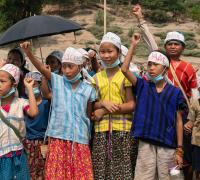Conflict-affected countries are the most vulnerable to climate, but receive the least funding
Taking an outset in Myanmar’s absence at COP28, MyCClimate coordinator, Helene Kyed (DIIS) shared her thoughts in P1 Morgen (DR) on 6 December about the low financing of conflict-affected countries when it comes to climate change.
According to the most recent numbers, they receive only 1,25 % of the global climate financing in comparison to countries not affected by violent conflict. This is despite the fact that conflict-affected countries are the most vulnerable to extreme weather events and have the lowest capacity to adapt to and cope with climate change.
This must change. The problem is that the COP set-up and global climate financing in general are very state-centred, with the majority of funding going through states. In conflict-affected countries states do often not have the capacity to implement climate change projects, and/or they lack territorial control and legitimacy to be able to ensure that climate change funding reaches vulnerable people. This raises the need to focus more on non-state actors and civil society organizations that work on the ground and have legitimacy.
In the case of Myanmar, it is wise that the UN excludes the military junta from a seat at the COP28 negotiating table, because the junta is not legitimate in the eyes of the population and effectively has very little control of the country. However, there is a need to think in alternative forms of civilian representation, so that climate-vulnerable countries are not forgotten.
DIIS Experts


